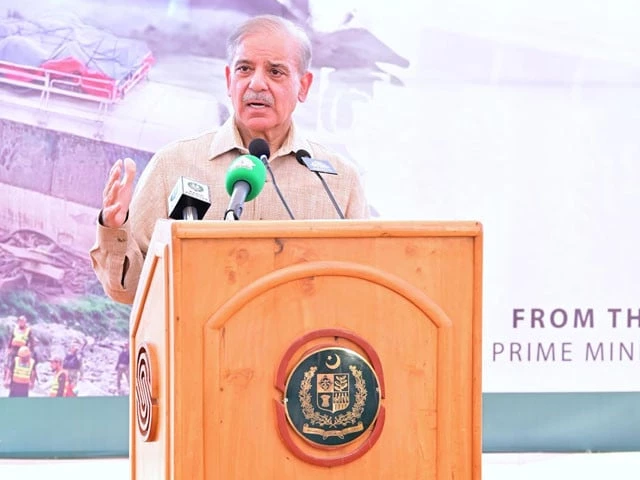Prime Minister Shehbaz Sharif announced a Rs4 billion relief package for the flood-hit Gilgit-Baltistan (G-B) region, alongside plans for a 100-megawatt solar energy project and the establishment of a Danish School for underprivileged children.
The announcement came during a ceremony to distribute compensation cheques among victims of recent cloudburst-triggered flash floods on Monday. Each family of the deceased received Rs1 million, while seriously injured individuals were given Rs500,000. Victims with minor injuries received Rs200,000 and those who lost homes were granted Rs500,000 for rebuilding.
“We must act in time. If we do not prepare in advance, no amount of effort will be enough during a crisis,” Shehbaz warned, stressing the importance of a functional early warning system. He criticised the lack of implementation despite the system being on paper for seven years.
The prime minister underlined Pakistan’s vulnerability to climate-induced disasters, noting the country ranks among the top ten globally. He pledged to continue visits to the region until all affected families are fully rehabilitated.
Shehbaz compared the latest aid package with the 2022 disaster response, stating that financial support had significantly increased. He urged the G-B government to also contribute to relief efforts.
The Ministry of Communications, he said, is actively working on road repairs. The solar project, due for completion within the year, aims to ease the winter electricity shortfall in the mountainous region.
Prime Minister Muhammad Shehbaz Sharif distributes compensation and relief cheques amongst the affectees of recent floods in Gilgit Balitistan. pic.twitter.com/enTA6XLLb5
— Government of Pakistan (@GovtofPakistan) August 4, 2025
Highlighting the importance of education, Shehbaz announced the creation of a Danish School, which will offer merit-based, quality education to children from low-income families. “Education is not expenditure—it is an investment in our nation’s future,” he said.
A special committee comprising Federal Minister for Kashmir and G-B Affairs Engineer Amir Muqam and Advisor Rana Sanaullah has been formed to address the region’s issues. The group will coordinate with the G-B governor and chief minister.
The event was attended by top federal and regional officials, including NDMA Chairman Lt Gen Inam Haider, and ministers Abdul Aleem Khan and Attaullah Tarar.
Earlier, Prime Minister Shehbaz Sharif arrived in G-B and chaired a high-level meeting to review the damage caused by recent heavy rains, flash floods, and cloudbursts in the region.
He was received by Governor Syed Mehdi Shah, who briefed him on the scale of destruction caused by persistent rainfall, including landslides and flooding.
Expressing sorrow over the losses, the prime minister said G-B had suffered significant damage due to extreme weather events. He reiterated that Pakistan is among the countries most severely affected by climate change, despite contributing minimally to global carbon emissions.
Shehbaz stressed that the impacts of climate change are intensifying each year and called for urgent, effective measures to combat them. He said the Ministry of Climate Change has been directed to take immediate action.
Declaring the National Disaster Management Authority (NDMA) a key national institution, he noted that federal agencies are working closely with the G-B government to accelerate relief and rescue operations.
The prime minister also received a ground-level briefing on the situation and was informed of the status of ongoing development projects in the region, as well as efforts by the local administration to manage the crisis.
Both leaders offered prayers for those who lost their lives in the floods. The prime minister expressed deep concern over the damage to infrastructure, homes, and livelihoods, and assured the region of the federal government’s full support.
Tourists among dead as emergency declared in 37 flood-hit areas
G-B government declared a state of emergency in 37 areas across the mountainous region after floods claimed at least 10 lives, most of them tourists, and left several others missing.
Read: Emergency declared in 37 G-B flood-hit areas
Four people were reported injured while at least a dozen more remain unaccounted for, with rescue operations ongoing.
According to a notification issued by the G-B Home Department, the affected locations span eight districts, including Diamer, Gilgit, Ghizer, Skardu, Shigar, Ghanche, Nagar and Kharmang.
Entire villages have been swamped, roads washed away, and homes reduced to rubble as swollen rivers surged through valleys with terrifying force.
“People have suffered losses which include loss of human lives, livestock, damage to houses, infrastructure and standing crops,” the notification read, invoking the National Calamities (Prevention and Relief) Act, 1958.
G-B government spokesperson Faizullah Faraq confirmed that 22 vehicles had been swept away and 509 houses were destroyed in the floods.
Flash floods claim 299 lives across Pakistan since late June
While G-B bears the immediate brunt, the broader picture across Pakistan is equally alarming. According to the National Disaster Management Authority (NDMA), floods and torrential rains since June 26 have killed 299 people nationwide, including 140 children.
Read more: Flash floods killed 299 across Pakistan since June 26: NDMA
Another 715 individuals have been injured, while over 1,600 houses have either been damaged or destroyed. The loss of 428 livestock has further deepened the hardship for affected families.
The NDMA has conducted 223 rescue operations and evacuated nearly 2,900 people from flood-hit areas.
Thousands of essential relief items, including tents, hygiene kits, food packs and de-watering pumps, have been dispatched to affected communities. Medical teams have treated hundreds across 71 emergency camps.
From August 4 onward, a fresh monsoon wave is expected to intensify, raising the risk of flash floods, landslides and glacial lake outburst floods in vulnerable regions.

